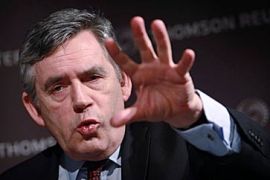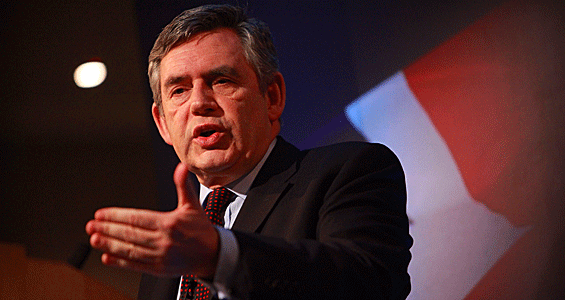Profile: Gordon Brown
British prime minister resigns following his party’s poor showing in general election.

 |
| Gordon Brown took over from Tony Blair as British prime minister in 2007 [GALLO/GETTY] |
Gordon Brown resigned as British prime minister and Labour party leader on May 11 after his party was unable to form a government with the smaller Liberal Democrats following the country’s inconclusive election five days earlier.
The 59-year-old Scot, who waited for years to take over from Tony Blair, his predecessor, finally took power in 2007.
Keep reading
list of 4 itemsPalestinian Prisoner’s Day: How many are still in Israeli detention?
‘Mama we’re dying’: Only able to hear her kids in Gaza in their final days
Europe pledges to boost aid to Sudan on unwelcome war anniversary
In his resignation speech, Brown said the job had been “a privilege” and wished David Cameron, his successor and leader of the Conservative party, well.
He said: “Only those who have held the office of prime minister can understand the full weight of its responsibilities and its great capacity for good.
“I have been privileged to learn much about the very best in human nature, and a fair amount, too, about its frailties, including my own.
“Above all, it was a privilege to serve and, yes, I love the job, not for its prestige, its titles and ceremony, which I do not love at all.
“No, I loved the job for its potential to make this country I love fairer, more tolerant, more green, more democratic, more prosperous and more just – truly a greater Britain.”
‘Clunking fist’
Brown had been widely expected to take over the leadership of the Labour party in 1994 following the death of John Smith, but eventually backed Blair for the position.
| In depth |
|
|
In an interview in February 2010, Brown revealed that Blair had secretly promised to hand over power to him later, but that the two men later fought bitterly after Blair failed to keep his side of the bargain.
After being appointed finance minister in 1997, and eventually becoming the country’s longest-serving finance minister in 200 years, Brown took over from Blair in 2007 after he resigned as prime minister following pressure over the Iraq war.
Handing power to Brown, who took up the position unopposed, Blair labelled his colleague a “big, clunking fist”.
After a brief honeymoon period in which he dealt with crises including a foiled bomb plot in London and severe flooding, Brown’s popularity dived after he pulled back from calling an expected general election that October.
The following month, an opposition politician said Brown had gone “from Stalin to Mr Bean”, a slapstick British TV comedy character, in just a few weeks.
Fragile economy
Brown’s slump stirred his critics within Labour and he faced repeated attacks from his own politicians as well as plots to get rid of him.
But the credit crunch in late 2008 appeared to reinvigorate the embattled premier.
Brown took a leading role in co-ordinating the global response to the crisis, prompting Nobel Prize-winning economist Paul Krugman to wonder if he had “saved the world financial system”.
His decision to rescue the country’s struggling banks by propping them up with government money was copied by many other nations.
But while his efforts helped his reputation abroad, Britain still suffered a record recession and was the last major world power to emerge from it.
Personal life
Brown was born in 1951, the son of a Church of Scotland minister.
He attended Kirkcaldy High School, where he was placed in an academic fast stream.
Brown went to Edinburgh University aged 16, where he gained a degree and a doctorate in history, and was elected to a top student position, effectively launching his political career.
This was despite a rugby accident which left him blind in one eye and seriously limited his vision in the other.
 |
| Brown married his wife, Sarah, in 2000 [EPA] |
Brown lectured at Edinburgh and then at Glasgow before working as a TV journalist.
In the 1979 general election, he stood for the Edinburgh South constituency, but lost.
He was elected to parliament as Labour MP for Dunfermline East in 1983, becoming opposition spokesman on trade and industry in 1985.
Brown was the shadow chief secretary to the treasury from 1987 to 1989 and then shadow secretary of state for trade and industry, before becoming shadow chancellor in 1992.
The prime minister, who has often been cast as a politician fixated on his job at the expense of a normal life, managed to alter public appearances when he married Sarah Macaulay, his long-time girlfriend, in 2000.
The couple have two young sons, John and Fraser. A daughter, Jennifer, died in 2002, days after being born prematurely.
